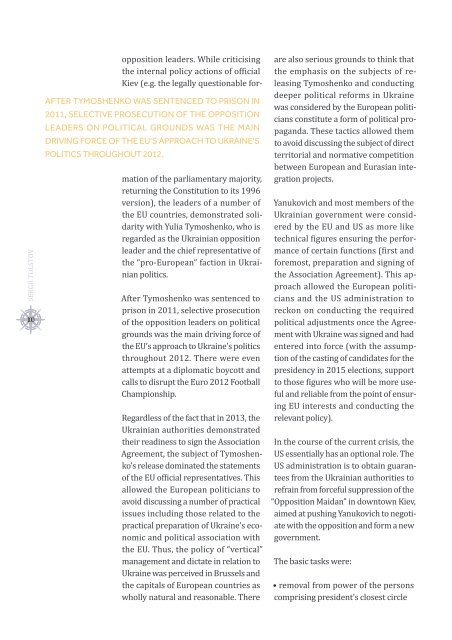Caspian Report - Issue 06 - Winter 2014
You also want an ePaper? Increase the reach of your titles
YUMPU automatically turns print PDFs into web optimized ePapers that Google loves.
SERGII TOLSTOV<br />
100<br />
AFTER TYMOSHENKO WAS SENTENCED TO PRISON IN<br />
2011, SELECTIVE PROSECUTION OF THE OPPOSITION<br />
LEADERS ON POLITICAL GROUNDS WAS THE MAIN<br />
DRIVING FORCE OF THE EU’S APPROACH TO UKRAINE’S<br />
POLITICS THROUGHOUT 2012.<br />
opposition leaders. While criticising<br />
the internal policy actions of official<br />
Kiev (e.g. the legally questionable formation<br />
of the parliamentary majority,<br />
returning the Constitution to its 1996<br />
version), the leaders of a number of<br />
the EU countries, demonstrated solidarity<br />
with Yulia Tymoshenko, who is<br />
regarded as the Ukrainian opposition<br />
leader and the chief representative of<br />
the “pro-European” faction in Ukrainian<br />
politics.<br />
After Tymoshenko was sentenced to<br />
prison in 2011, selective prosecution<br />
of the opposition leaders on political<br />
grounds was the main driving force of<br />
the EU’s approach to Ukraine’s politics<br />
throughout 2012. There were even<br />
attempts at a diplomatic boycott and<br />
calls to disrupt the Euro 2012 Football<br />
Championship.<br />
Regardless of the fact that in 2013, the<br />
Ukrainian authorities demonstrated<br />
their readiness to sign the Association<br />
Agreement, the subject of Tymoshenko’s<br />
release dominated the statements<br />
of the EU official representatives. This<br />
allowed the European politicians to<br />
avoid discussing a number of practical<br />
issues including those related to the<br />
practical preparation of Ukraine’s economic<br />
and political association with<br />
the EU. Thus, the policy of “vertical”<br />
management and dictate in relation to<br />
Ukraine was perceived in Brussels and<br />
the capitals of European countries as<br />
wholly natural and reasonable. There<br />
are also serious grounds to think that<br />
the emphasis on the subjects of releasing<br />
Tymoshenko and conducting<br />
deeper political reforms in Ukraine<br />
was considered by the European politicians<br />
constitute a form of political propaganda.<br />
These tactics allowed them<br />
to avoid discussing the subject of direct<br />
territorial and normative competition<br />
between European and Eurasian integration<br />
projects.<br />
Yanukovich and most members of the<br />
Ukrainian government were considered<br />
by the EU and US as more like<br />
technical figures ensuring the performance<br />
of certain functions (first and<br />
foremost, preparation and signing of<br />
the Association Agreement). This approach<br />
allowed the European politicians<br />
and the US administration to<br />
reckon on conducting the required<br />
political adjustments once the Agreement<br />
with Ukraine was signed and had<br />
entered into force (with the assumption<br />
of the casting of candidates for the<br />
presidency in 2015 elections, support<br />
to those figures who will be more useful<br />
and reliable from the point of ensuring<br />
EU interests and conducting the<br />
relevant policy).<br />
In the course of the current crisis, the<br />
US essentially has an optional role. The<br />
US administration is to obtain guarantees<br />
from the Ukrainian authorities to<br />
refrain from forceful suppression of the<br />
“Opposition Maidan” in downtown Kiev,<br />
aimed at pushing Yanukovich to negotiate<br />
with the opposition and form a new<br />
government.<br />
The basic tasks were:<br />
• removal from power of the persons<br />
comprising president’s closest circle










